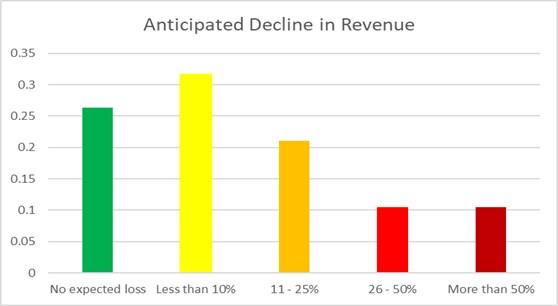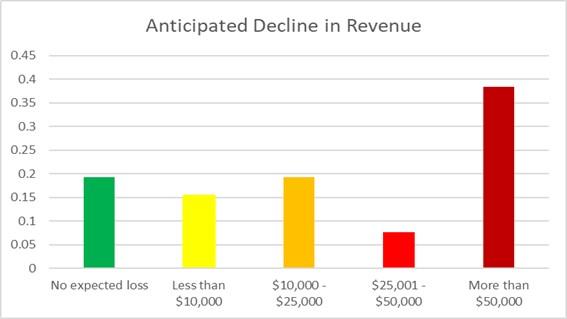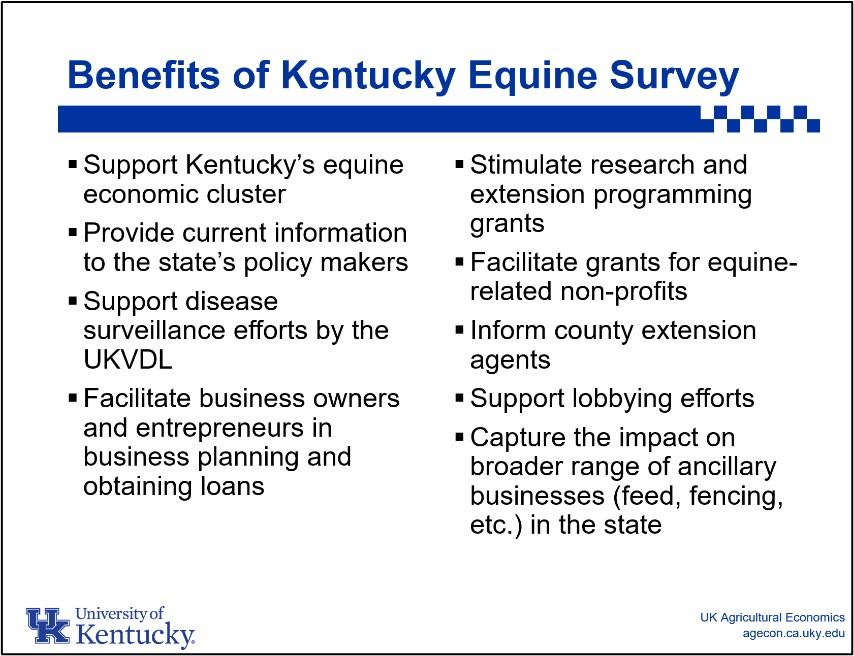UK Equine Research Showcase Recap: Impacts of COVID-19 on Kentucky’s Equine Markets
Jill Stowe, PhD, associate professor in the University of Kentucky Department of Agricultural Economics, provided a high-level overview on what is brewing in equine markets for her presentation at the 10th Annual UK Equine Research Showcase. She reviewed her research on the impact of COVID-19 on Kentucky’s equine markets and the 2022 Kentucky Equine Survey.
Stowe’s research on Kentucky equine markets amidst COVID-19 was conducted with assistance from colleagues, Robert Coleman, PhD, equine extension specialist in the Department of Animal and Food Sciences, and student Jenna Bryant.
“The main question we are asking is how have restrictions from COVID-19 affected Kentucky’s equine operations,” Stowe said.
To begin studying COVID-19’s impact on equine markets, the research group surveyed stallion operations, competition managers and equine boarding, training and lesson operations in Kentucky. For stallion operations, more than 50% reported no unexpected decline in in the number of mares bred with the exception of a decline in sires with lower stud fees. A total of 80% reported that no new breeding incentives were offered and 93% reported there was little to no increase in operating costs due to COVID-19 restrictions. [MJN1]
Boarding, training and lesson operation survey results indicated a stronger impact from COVID-19, with 89% of survey participants reporting the need to make initial changes to continue to operate under pandemic restrictions. About 32% initially closed, with the exception of essential employees, until they were able to find ways to operate safely under the new guidelines. Survey results also indicated that few respondents utilized the Paycheck Protection Program or filed for unemployment. Furthermore, 42% of operations reported a loss in clients due to operational changes or clients’ inability to pay their bills; however, a handful of respondents actually reported increased business since riding lessons were one of the few permissible activities early on.

Unfortunately, survey results showed that competition enterprises likely suffered the most as a result of the COVID-19 pandemic with the cancellation of 67 competitions. Out of those, only 22 competitions were rescheduled. Competition managers had to make tremendous adaptations to be able to run under COVID-19 restrictions, which had a major impact on the number of shows that were able to continue. The one silver lining, Stowe said, was that there was an increase in competition participation for the events that were still able to run.

“This segment of the industry, we are going to find, was hit harder and might need some help getting back on their feet,” Stowe said.
Stowe then transitioned to the 2022 Kentucky Equine Survey. A comprehensive equine survey was last conducted by UK in 2012. Stowe is interested in conducting a new comprehensive survey to provide both current information and an analysis of changes that have occurred over the 10 year period. The data generated provides important information about the economic impact and reach of Kentucky’s equine industry. The ability to conduct a survey in 2022 is directly dependent on support from the industry financially and through advocacy.
“We would like to see this survey happen because I think it is really important for the long-run sustainability of the industry,” Stowe said.

If you are interested in learning more about the 2022 Kentucky Equine Survey initiative, contact Stowe at jill.stowe@uky.edu. Learn more about the 2012 Kentucky Equine Survey here: http://equine.ca.uky.edu/kyequinesurvey.
Erin DesNoyers is operations coordinator for UK Ag Equine Programs.
